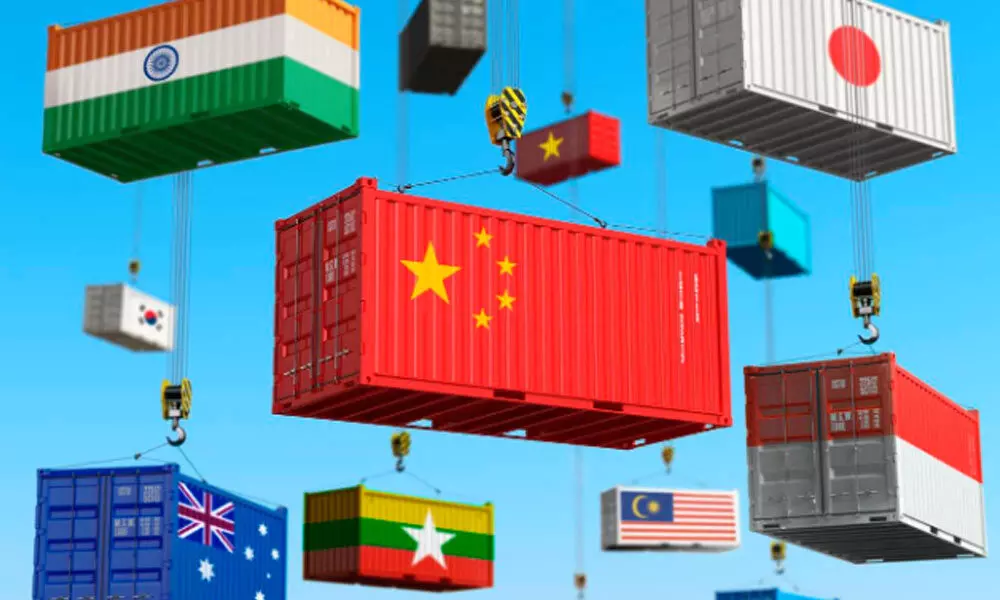Welcome to the Might-Is-Right Global Trade Era
To engage in economic coercion of trading partners and joining them in a new trading bloc is an emblem of our times
image for illustrative purpose

If you wanted a demonstration of how the world's largest free trade area is likely to fall short of expectations, you could do worse than look at the customs sheds at Shanghai's Pudong airport.
As final preparations for signing the Regional Comprehensive Economic Partnership pact, orRCEP, were being made earlier this month, several metric tons of Australian lobster were being delayed at the Chinese border for several days — far longer than the six-hour time frame for perishable goods under RCEP rules. That was owing to an unofficial order from Beijing to hold up seven categories of products from the country. Diplomatic relations between the two have been fraying and China's foreign ministry this month told Australians to "reflect upon their deeds" if they wanted a better economic relationship.
To engage in economic coercion of your trading partners while simultaneously joining them in a new trading bloc is an appropriate emblem of our times. Attempts to build a rules-based global order after the fall of the Soviet Union have given way to a new era of might-is-right diplomacy. The trend is so pervasive that even touted free-trade deals are being shaped in its image.
To be sure, the final texts to emerge from the RCEP look surprisingly positive. India's decision to pull out last year probably made it easier for the remaining countries to come to agreement. Possibly as a result, the wording on sticky issues like investment, services and agriculture looks stronger than anticipated, according to an analysis by Deborah Elms, executive director of the Singapore-based Asian Trade Centre.
Even so, the bloc will fall short of the sort of comprehensive agreement seen in the European Economic Area or even the reformed Trans-Pacific Partnership, known as the CPTPP, which now binds key RCEP members including Australia, Japan and Vietnam after the U.S. dropped out.
From one perspective, that doesn't really matter. The agreement will lift China's gross domestic product by 0.5 per cent over the period to 2030, according to Bloomberg Intelligence economist Yuki Masujima. South Korea, which hasn't hitherto joined a major trade bloc, will see a 1.4 per cent benefit, while the uplift for Japan will be 1.3 per cent.
The trouble is that those gains, while real, are so modest. The vision that drove the founding of the World Trade Organization saw nations across the world reducing their tariffs, harmonizing their rules and agreeing to a common dispute and enforcement mechanism to encourage more commerce and investment across borders.
The RCEP and CPTPP revert to an older vision of trading blocs, where deepening integration within the zone is matched by fraying ties with outsiders. An outgrowth of the Association of Southeast Asian nations, the RCEP is increasingly now seen as a sort of Pax Sinica, binding the region into a China-led global order. CPTPP, for its part, was explicitly sold as an American attempt to restrain China's global ambitions before Washington itself quit the grouping.
That feels less like free trade and more like imperial preference, which prevailed across much of the world in the late 19th and early 20th centuries. Under that system, Europe's powers ran trade surpluses with their empires while erecting barriers externally. The withering of intra-European economic ties ultimately contributed to the disaster of the First World War.
As authors Matthew Klein and Michael Pettis have written, the uneven balance of payments also impoverished the colonies on which the system depended. That pattern is being repeated now, as inequality within major trading nations and the imbalances between them feed off each other in a deepening spiral that's driving dissatisfaction, unrest and nationalist populism.
On their own, neither the RCEP nor CPTPP are going to take us down that road. As we've written, four years of fiery rhetoric between Beijing and Washington haven't stopped China becoming ever more integrated with the world economy. Still, the World Trade Organization has been turned into a toothless tiger, and even its current diminished form is under attack, with the U.S. vetoing Ngozi Okonjo-Iweala's bid to take over as director-general. Despite a recovery from the depths of Coronavirus, world trade volumes are still running at their lowest levels in four years. We shouldn't let the signing of a new deal blind us to the parlous state of global commerce. (Bloomberg)

